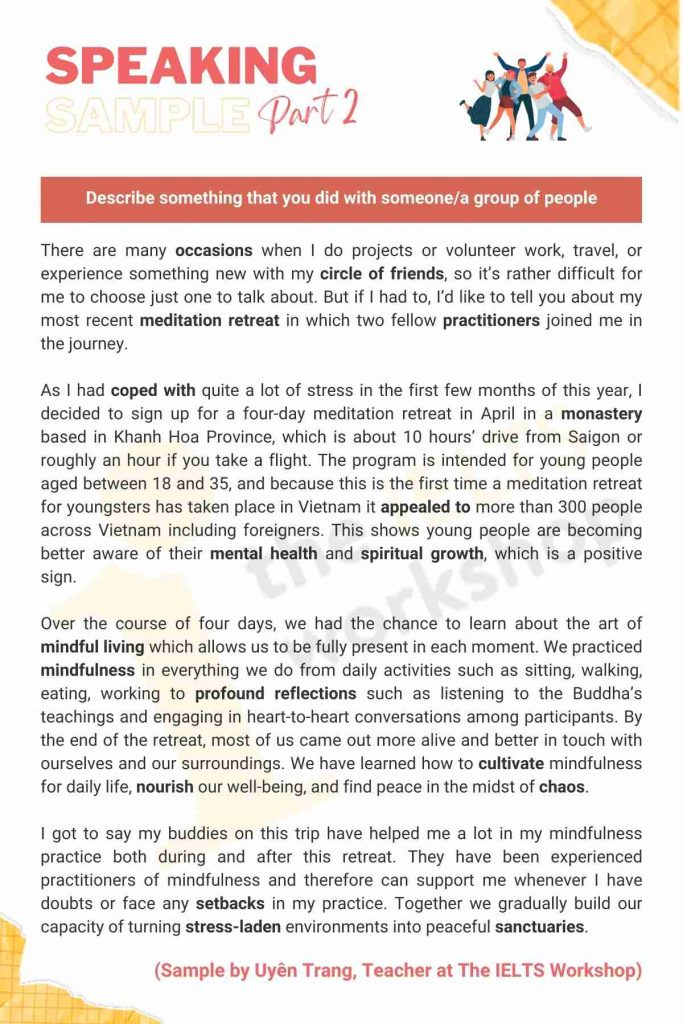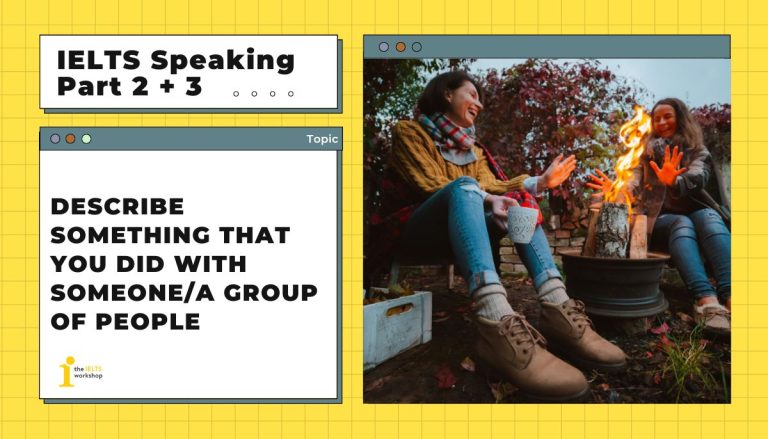Trong chuyên mục giải đề IELTS Speaking kỳ này, cùng tham khảo chủ đề: “Describe something that you did with someone/a group of people” qua bài mẫu của cô Uyên Trang từ The IELTS Workshop dưới đây nhé.
Part 2: Describe something that you did with someone/a group of people
Describe something that you did with someone
You should say:
What it was
Who you did it with
How long it took you to do this
And explain why you did it together
Dưới đây là bài mẫu cho topic “Describe something that you did with someone/a group of people”.
1. Bài mẫu (Sample)

2. Từ vựng (Vocabulary)
- Occasion (noun): dịp, cơ hội
- Circle of friends (collocation): vòng tròn bè bạn
- Meditation retreat (collocation): khoá tu thiền
- Practitioner (noun): người thực hành
- Cope with (phrasal verb): đương đầu với
- Monastery (noun): tu viện
- Appeal to (verb): thu hút
- Mental health (collocation): sức khỏe tinh thần
- Spiritual growth (collocation): phát triển tâm linh
- Mindful living (collocation): lối sống chánh niệm/ tỉnh thức
- Mindfulness (noun): chánh niệm
- Profound reflection (collocation): chiêm nghiệm sâu sắc
- Cultivate (verb): nuôi dưỡng
- Nourish (verb): nuôi dưỡng
- Chaos (noun): sự xáo trộn
- Setback (noun): khó khăn, trở ngại
- Stress-laden (adjective): nhiều căng thẳng
- Sanctuary (noun): thánh địa
Part 3
How do you get along with your neighbors?
How do neighbors help each other?
Do you think neighbors help each other more often in the countryside than in the city?
How do children learn to cooperate with each other?
Do you think parents should teach children how to cooperate with others? How?
Do you think it’s important for children to learn about cooperation?
1. How do you get along with your neighbors?
Although I’m an introverted person who tends to avoid frequent contact with people unless it’s necessary, I try to remain on good terms with my neighbors. One of the simplest things I can do is to greet them with a friendly ‘Hello’ and ask them about their life when I spot them around the neighborhood. I also offer them delightful food my mother painstakingly prepares whenever our family throws a feast, which they highly appreciate. Thanks to this amicable relationship, our neighbors are more than willing to keep their eye on our property when our family is away for week-long vacations.
- Introverted (adjective): hướng nội
- On good terms with: hoà hợp với
- Painstakingly (adverb): khó nhọc
- Throw a feast (verb phrase): thết đãi tiệc
- Amicable (adjective): hoà ái
- Keep one’s eye on sth (verb phrase): để mắt tới
2. How do neighbors help each other?
Neighbors can help each other in various ways. The most practical form of mutual support can take place from everyday life situations such as lending household appliances, sharing rides to work or school, or pet care to emergency assistance in case of accidents, health issues, or natural disasters. That said, people who live in the same local area can connect with each other on a deeper level by showing social and emotional support. We have seen this clearly during the Covid-19 pandemic when neighbors were happy to share food and toiletries with people in need as well as imitiate online bonding activities to ease feelings of isolation due to prolonged closures. These interactions not only help with practical needs but also build stronger, more cohesive communities in the long run.
- Mutual support (collocation): hỗ trợ lẫn nhau
- Cohesive (adjective): gắn kết chặt chẽ
3. Do you think neighbors help each other more often in the countryside than in the city?
I think that the sense of community is better felt in the countryside than in the city. This is largely because of several interconnected factors related to lifestyle and community dynamics. For the most part, rural areas have lower population density meaning there are fewer people, so neighbors tend to know each other better and form closer-knit communities. Rural residents also live further apart, making mutual assistance more necessary and appreciated. Besides, rural life often involves dealing with natural elements, farming, or maintaining larger properties, which can be challenging without cooperation. City life, however, often involves greater autonomy due to higher population density and a faster pace of life, which can limit frequent interactions between neighbors. This is not to mention that urban residents often have more immediate access to a wide range of services, reducing the need to rely on neighbors for support.
- Population density (noun phrase): mật độ dân số
- Close-knit (adjective): khăng khít
- Autonomy (noun): sự độc lập/ tự chủ
4. How do children learn to cooperate with each other?
Children can learn to work with others through a combination of developmental processes, social interactions, and guided learning experiences. By developmental processes, I mean as children’s brains develop, they gain the ability to understand others’ perspectives and regulate their emotions to manage frustration and work towards a common goal. These abilities are really essential for cooperation. Children can also rely on their interactions with others to develop language and social skills necessary for cooperation, such as expressing needs, listening, and resolving conflicts. By observing adults and peers working together, sharing and helping, children are more likely to emulate those cooperative behaviors. Last but not least, teachers and parents can involve children in guided play or set collaborative tasks, for example building a puzzle or planning a group project, so children can practice skills like sharing, turn-taking, and active listening. By engaging in these processes and experiences, children gradually learn the skills and behaviors necessary to cooperate effectively with others.
- Guided learning (collocation): học có hướng dẫn
- Regulate (verb): điều khiển, kiểm soát
- Resolve conflict (collocation): giải quyết xung đột
- Emulate (verb): bắt chước
5. Do you think parents should teach children how to cooperate with others? How?
I do agree that parents play a crucial role in teaching their children cooperative skills. This can be done numerous ways, one of which is parents modeling cooperative behaviors in everyday situations that require teamwork, such as cooking, cleaning, or gardening. By watching how their parents work with others, resolve conflicts, and support each other, children have a good understanding of what is expected of them. Parents can also arrange playdates (for example, building with blocks, board games, or group sports) with other children to provide their kids with opportunities for practicing cooperation in a social setting. Parents should also ensure to acknowledge and praise their children when they demonstrate cooperative efforts. Celebrating small wins with rewards or incentives such as stickers, extra playtime, or a special treat does help to encourage children to continue these actions.
- Praise (verb): khen ngợi
- Celebrate small wins (verb phrase): ăn mừng những chiến thắng nhỏ
- Incentive (noun): phần thưởng
6. Do you think it’s important for children to learn about cooperation?
Definitely. Learning about cooperation is essential for children for a host of reasons. For the most part, it lays the foundation for social and emotional development. Knowing how to work well with others enhances children’s communication skills and helps them build as well as maintain positive relationships with peers, family members, and adults. Because they can understand and consider others’ feelings and needs, they become better at developing empathy and compassion, which are admirable values to live by. Almost every career nowadays requires the ability to collaborate with others; therefore, knowing how to do so will set children up for long-term future success, both personally and professionally.
- Lay the foundation for sth (verb phrase): tạo nền tảng cho
- Empathy (noun): sự thấu cảm
- Compassion (noun): lòng từ bi/ trắc ẩn
- Set sb up for sth (verb phrase): chuẩn bị điều gì cho ai
Bài mẫu bởi cô Uyên Trang – Giáo viên The IELTS Workshop
Trên đây là bài mẫu cho topic: Describe something that you did with someone/a group of people. Các bạn có thể tham khảo các bài mẫu IELTS Speaking Part 2 khác của The IELTS Workshop tại đây!
Ngoài ra, khoá học Senior của The IELTS Workshop sẽ giúp bạn nâng cao kỹ năng cũng như xây dựng chiến lược trả lời câu hỏi, tham khảo ngay nhé!!









